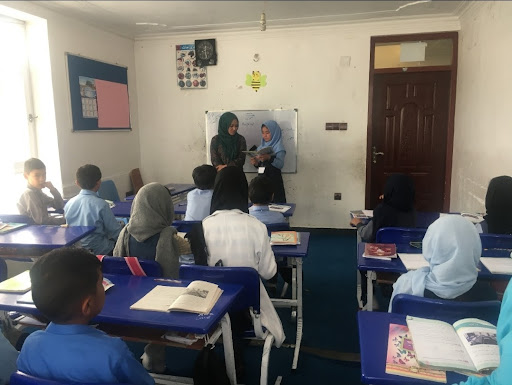Afghanistan: A Game of Dominoes

December 3, 2021
In the past two decades, Afghanistan has seen significant growth in education in the private sector. Hundreds of primary, secondary, and high schools were established in all major cities; especially in Kabul. A vast majority of the students were enrolled in public schools; however, many of the private schools are far more conceivable.
As Covid-19 spread around the world, all public and private sectors were affected. However, in Afghanistan, the damage was more on the private sectors, specifically on the education sector. The sharp decline in this sector caused many teachers to be unemployed, which in turn caused the founders of these sectors to be engulfed in a financial crisis. Some are at a point where they cannot even operate anymore.
While other countries may be back on track, Afghanistan had to face yet another wave of obstacles: the Taliban. For anyone who don’t know who Talibans are, they are vicious people who, in the name Islam, do unspeakable things. The only chance to re-open schools was crushed by the Taliban. No one is there to stand against them because they have even more power now since the U.S pulled their troops out after a twenty year presence.
Schools continued to stay closed, this time not because of a virus, but because of the fear of the Taliban. Taliban who are suspected of shootings and bombings at Hazara and Shia schools. They not only target the Shia people, Muslims in a significant branch of Islam, but they’re generally against education and freedom for girls and women. Private Schools would receive security threats, and as a response, a number of families have given up on schools. Others could no longer attend school due to their financial instability.
Since the financial costs of private schools were dealt with by collecting student fees, a 50% drop in students has led to a severe financial downturn for those schools. Much like the domino effect, when students don’t attend schools, fees aren’t submitted, school founders don’t have the money to pay teachers, and unemployment rates soar. The parents’ choices are slim: either keep their kids at home or send them to public schools. Knowing the conditions of the public schools, many parents would much rather keep their kids closer to them.
In any case, the problems that arise as a result of this financial poverty in the education sector are, first, the decline of education and the birth of extreme disabilities in the literacy level of primary and secondary school children and second, the financial problems of teachers and private school founders.
The only way to lift Afghanistan’s education in the private sector is through serious financial support from the international community, charities, and national and international investors. Otherwise, such a failure in the field of education will not be compensated for, and will have extensive consequences for future generations. Therefore, all support, direct or indirect, is greatly appreciated.
This is what Mohammad Arif Ahmady, who has a private school establishment in Afghanistan, has to say: “I have a private school by the name of “Rabia Balkhi Private School” in Kabul. Parents don’t pay their childrens’ fees and in turn, I don’t have the money to pay the school building’s rent. It has been nearly one year since I paid the last rent. If this situation continues, I might have to close the gates of my school to hundreds of students in need of proper education.”
Pitman High students can help by forwarding this article to any and all social media platforms. The biggest way for Pitman High students to help is through knowledge. So, please, educate yourself and your friends around you. For more information, you can read my 1st article, “7,466 Miles Worth of Difference” and if anyone wants to help out and donate or has any questions, please don’t hesitate to contact me.
School: [email protected]
Personal: [email protected]
Instagram: @aclmadiha04